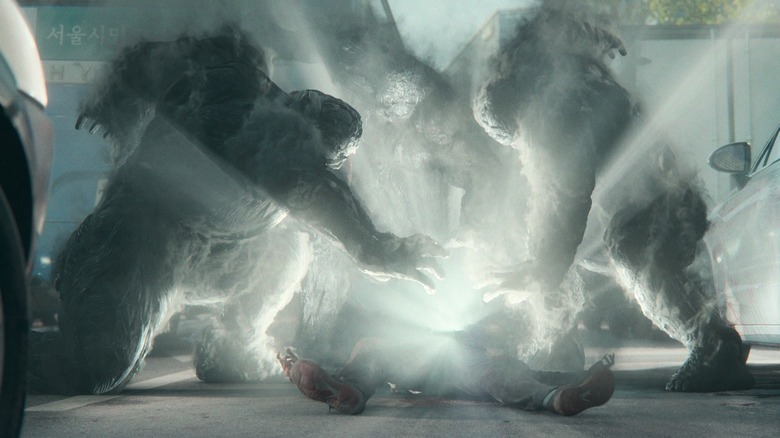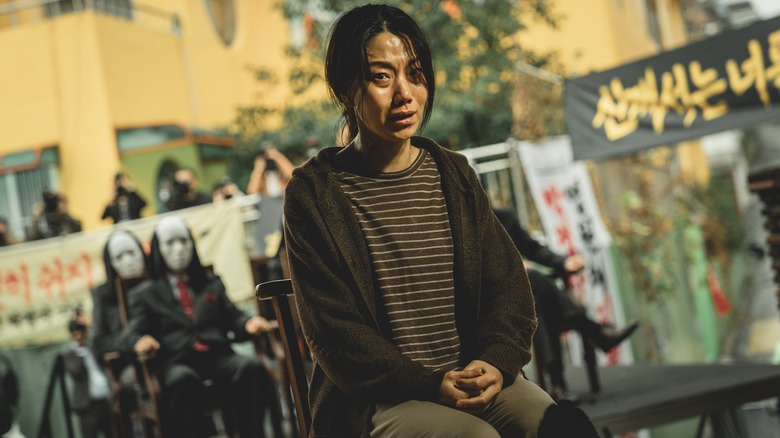The Ending Of Hellbound Explained
Faith and fear are at the heart of "Hellbound," a new Netflix dystopian thriller series from South Korea. The show begins with an unimaginable premise: seemingly ordinary people are visited by a supernatural apparition who tells them that they have been marked for death and will be taken to Hell at a certain date and time. When the said time arrives, a team of demons emerges from the ether and violently incinerates the victim.
Two separate religious movements claim that those who receive the decree are sinners and that the condemnations are an act of God, who is trying to show humanity the true path of righteousness. The New Truth Society works to make sure the public is aware of what is going on by trying to document and broadcast the supernatural events. Meanwhile, the Arrowhead is a fanatic and violent cult who believes God is pointing out the sinners and wants his followers to take matters into their own hands.
But midway through the six-episode season, there's a shocking revelation. Chairman Jeong Jin-soo (Yoo Ah-in), the leader of the New Truth Society, admits that he knew about the demons before the rest of humanity because he had been marked for death 20 years before the events of the show. It was he who invented the notion that the decrees are handed down to sinners because he was afraid that if humanity had no reasoning for the events, it would drive them to chaos.
He takes that secret to the grave and the New Truth Society grows in popularity. However, years in the future, a child is born that threatens to upend the vice grip they have on society.
Why is the baby so important?
As "Hellbound" Season 1 careens toward its conclusion, the attention of most of the main players is turned to the newborn baby of a skeptical TV producer named Bae Young-jae (Park Jeong-min) and his wife Song So-hyun (Won Jin-ah). Shortly after the child is born, it receives the decree that it will be taken to Hell. This is a serious blow to the New Truth Society.
As Min Hye-jin (Kim Hyun-joo) — an attorney who has long worked to expose the group as a fraud — notes, the New Truth Society's doctrine does not include the concept of original sin. They have convinced their followers that only those who have actively committed sins in their life are given the decree. If their followers were to see a newborn taken to Hell, it would prove what Chairman Jeong Jin-soo tried to hide, which is that the decrees are actually being passed out seemingly at random. This is why Min Hye-jin wants the parents to livestream the moment that their baby is taken to Hell.
Unlike some other similar shows about religious phenomena, "Hellbound" makes it very clear from the beginning that there are supernatural forces at play. There is no question that people are being horrifically killed by smoke demons. But nobody actually knows what the demons are or why they choose the people they choose. The New Truth Society and the Arrowhead — who are not officially linked, but often secretly collaborate — use the idea that the demons only come for sinners to try and control society. Their assumed morality also allows them to violently silence nonbelievers.
That is why when both groups find out about the newborn baby that is marked for Hell, each tries to stop the public from finding out.
The final dramatic showdown between Min Hye-jin and the cults
Although both the New Truth Society and the Arrowhead try to find the condemned child, they aren't able to intervene in time. Bae Young-jae and Song So-hyun bring their baby into the courtyard of an apartment building and ask the residents there to witness the child being taken to Hell. However, when the demons actually arrive, neither parent can't face the horror of watching their baby be tormented and killed. They hug the infant between them as the demons descend and when the family is zapped, both parents are incinerated, but the baby is left unharmed.
This is a very profound moment as, up until now, we've never seen a case where the decree wasn't fulfilled. That isn't lost on a character known as Skull Mask, an extremely zealous live-streamer who acts as the de facto leader of the Arrowhead. He arrives on the scene having received the decree that he will be taken to Hell shortly after the baby, which he has interpreted as meaning that he's been chosen to correct the error made by God when he condemned the infant. When he sees that the child is still alive, he tries to kill it in a fit of confusion. But Min Hye-jin manages to hold Skull Mask off until the demons come and take him to Hell.
All of this chaos has a pretty serious effect on the assembled crowd. Everything they've just seen flies in the face of what they've been told by the religious groups who claim to understand what's going on. When representatives of the New Truth Society show up and try to follow Min Hye-jin as she flees with the baby, the crowd refuses to let them through and calls the church members "pathetic crooks" and "a bunch of liars."
What Hellbound is really trying to say
Seeing the crowd turn on the New Truth Society is a major moment as the church has, up until that point, wielded a huge amount of social and political power. But now that the world has seen that their doctrine is false, it appears that their power is quickly crumbling away.
After escaping, Min Hye-jin and the baby manage to hail a cab. "I don't know much about God ... but there's one thing I do know," the taxi driver tells Min Hye-jin, "and that is that this world belongs to humans. We should settle our matters ourselves."
This statement is, in many ways, a perfectly succinct summarization of the main thematic threads of "Hellbound." Although the demons are a terrifying violent force, it isn't something humanity actually has any control over. This is a horrible prospect but it's one that is made significantly worse by the New Truth Society and the Arrowhead.
Both groups seized on a moment when humanity was facing extreme fear and confusion and used it to gain an outsized amount of influence. The New Truth Society, in particular, actively worked to hide the fact that they knew their own doctrine was false. They claimed that they wanted to help society by showing everyone God's plan, but the reality is, they wanted to scare people into believing they had all the answers so they could wield power over them. Think of them like a preacher who claims that a deadly hurricane is God's punishment for humanity's sins.
The taxi driver's remarks get at the heart of what "Hellbound" is trying to say. It's not asking viewers to disbelieve in the supernatural. Rather, it's asking us to remain skeptical of those who manipulate our fears of the supernatural to try and exert power over others.
How Hellbound's cliffhanger ending sets up a potential Season 2
The ending of "Hellbound" is a classic "good news, bad news" situation. The good news is that Min Hye-jin has struck a major blow against the New Truth Society. The bad news is that we've gotten no closer to understanding what the demons are or how to stop them. In the episode's final moments, we also learn that there are more to the decrees than we previously knew.
The finale ends in the museum dedicated to Park Jeong-ja (Kim Shin-rok), a woman who was taken by the demons during a live television broadcast that helped the New Truth Society "prove" their claims. The house she was taken in has been preserved along with her charred remains, which are kept under a plexiglass case. As the camera zooms in on her skeleton, it begins to shake, and after a few intense moments, Park Jeong-ja is reanimated and seemingly brought back to life.
This cliffhanger implies that there are plans for another season of "Hellbound" and it also hints at what that season may explore. While Season 1 focused on the human response to the arrival of the demons, we don't actually learn much about the phenomenon itself. By introducing this new wrinkle to the process — that those condemned to Hell may eventually be resurrected — the show is perhaps indicating that if there is a Season 2, we might be digging deeper into the actual mythology of the demons themselves.
Why was Park Jeong-ja resurrected? What will she have to say about what she experienced? And while we're at it, why was the baby spared by the demons? We'll just have to hope that Netflix renews "Hellbound" for a second season so we can get those answers.




